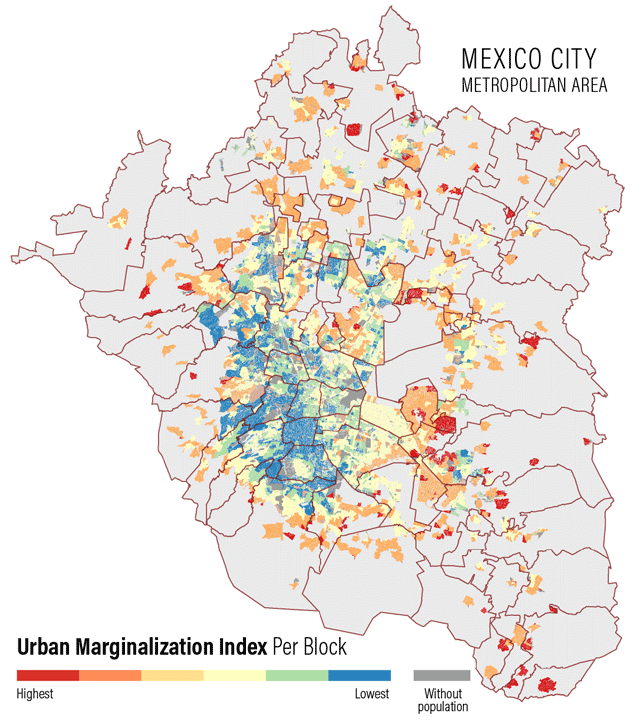
In Mexico City, someone living in one of the wealthiest neighborhoods has 28 times better access to jobs in a 30-minute trip by public transit and walking than someone living in the poorest areas.
Twenty-eight times. And this says nothing about the quality of these jobs or the income associated with them.
Wealth, in this case, is measured by the government’s Urban Marginalization Index, which combines social, economic, demographic and access to services indicators. Access to jobs is measured by the total number of formal jobs in each neighborhood from Mexico’s Economic Census and calculations of travel time using the street grid and public transit map.
The stark spatial divide between the haves and the have-nots in the city is evident across multiple measures. The same basic pattern exists for other opportunities and services, including health care, public transportation, primary, secondary and higher education, food, recreation, and culture.
It’s not news that jobs, services and culture tend to cluster in cities. The poorest tend to live further away from these opportunities, often because it is where they can afford housing. But these maps are a stark reminder of how the difficulties and vulnerabilities of poverty can manifest spatially and compound with one another to become greater than the sum of their parts.
And Mexico City isn’t unique. We find variations of this pattern in cities around the world, especially in countries with greater social and economic inequality.
This is just another example of why anyone who cares about thriving and productive cities should redouble their efforts to address inequality. The latest working paper in the World Resources Report series, Towards a More Equal City, further explores the relationship between accessibility and equity, diving deep into the cases of Mexico City and Johannesburg. Read more about housing’s contributions to inequality in the series’ working paper on housing and about urban inequality, generally, in the series framing paper.
Mauricio Brito is an Urban Development Analyst at WRI México Ross Center for Sustainable Cities.
Lorelei Ramírez Reyes is Urban Economics Coordinator at WRI México Ross Center for Sustainable Cities.
Jorge Macías is Director of Urban Development and Accessibility at WRI México Ross Center for Sustainable Cities.
Eric Mackres is the Data and Tools Manager for Urban Efficiency & Climate at WRI Ross Center for Sustainable Cities.





